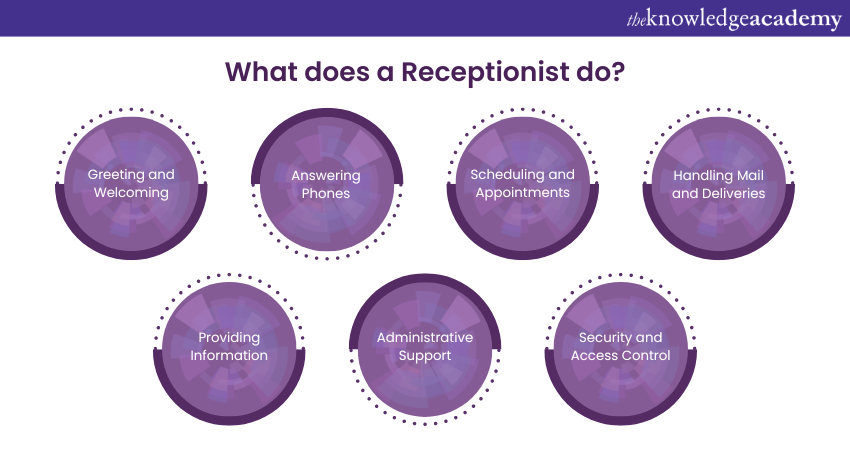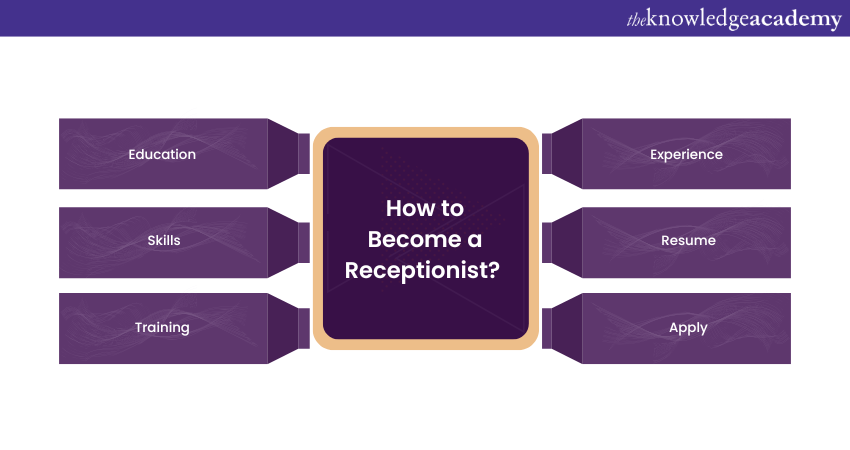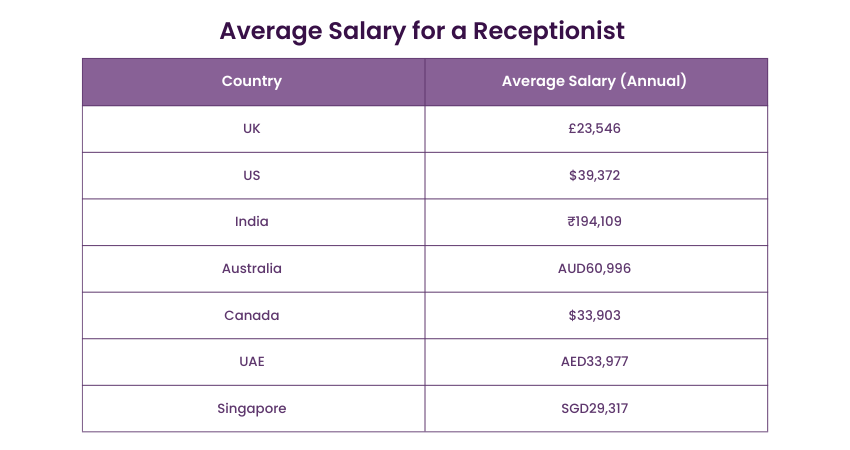We may not have the course you’re looking for. If you enquire or give us a call on +40 316317743 and speak to our training experts, we may still be able to help with your training requirements.
Training Outcomes Within Your Budget!
We ensure quality, budget-alignment, and timely delivery by our expert instructors.

Wondering “How to Become a Receptionist?” You’re in the right place! This blog is your go-to resource, a guide for aspiring Receptionists. Imagine being the welcoming face that greets the world with a warm smile and keeps everything running smoothly behind the scenes. We will share insider tips on developing top-notch communication skills and the secret to juggling tasks with ease. So, if you’re eager to jump into this vibrant role, let’s unveil the steps on How to Become the Receptionist who’s the highlight of everyone’s day!
Table of content
1) Who is a Receptionist?
2) What does a Receptionist do?
3) How to Become a Receptionist?
4) Advantages of Pursuing a Career as a Receptionist
5) Average Salary for a Receptionist
6) Conclusion
Who is a Receptionist?
A Receptionist is an administrative professional who is typically the first point of contact for visitors or callers to an organisation. The role of a Receptionist is to greet people, answer inquiries, and direct them to the appropriate person or department within the organisation.
Receptionists often work in various settings, including offices, hotels, medical facilities, and other businesses where there is a need for a front desk or reception area.
What does a Receptionist do?
A Receptionist performs a variety of tasks that lead to the smooth operation of an organisation. The exact responsibilities of a Receptionist can differ based on the organisation and industry in which they work in. However, generally, their duties encompass the following areas:

1) Greeting and Welcoming: Receptionists are often the first point of contact for visitors. They greet guests, provide information, and create a positive and welcoming atmosphere.
2) Answering Phones: Receptionists handle incoming calls, respond to queries, record messages, and route calls to a suitable individual or department.
3) Scheduling and Appointments: Receptionists may schedule appointments and meetings, maintaining calendars for executives or specific departments.
4) Handling Mail and Deliveries: Receptionists receive and distribute mail, packages, and other deliveries, ensuring they reach the intended recipients.
5) Providing Information: Receptionists offer information about the organisation, its products or services, and other relevant details to visitors and callers.
6) Administrative Support: In some organisations, Receptionists may also be involved in various administrative duties, including data entry, organising files, and overseeing the management of office supplies.
7) Security and Access Control: In some settings, Receptionists is responsible for monitoring access to the premises, signing in visitors, and ensuring security protocols are followed.
Enhance your career with our Reception Skills Course! Master communication, organisation, and customer service to become a standout receptionist!
How to Become a Receptionist?
To become a Receptionist, follow these steps:

Education
Getting a high school diploma or an equivalent qualification is essential. This is the minimum requirement to start a career as a Receptionist. Additional courses related to office skills can improve your prospects. Having basic computer skills is also advantageous.
Skills
Focus on enhancing your communication and organisational abilities. Being able to interact well with people and manage tasks efficiently is crucial. Learn how to use common office software like word processors and spreadsheets. Good customer service skills are also important for this role.
Training
Consider taking courses in customer service or office administration. These courses are often available online or at community colleges. They give valuable knowledge and Receptionist Skills that can set you apart from other candidates. Training can also boost your confidence in handling Receptionist duties.
Experience
Gaining relevant office experience is highly beneficial. Internships, entry-level office positions, or even volunteer work can provide valuable experience. Employers appreciate candidates who have hands-on experience. Practical experience shows that you can perform the job effectively.
Resume
Create a resume that highlights your relevant skills and experiences. Include details of any training or previous jobs related to office work. Ensure your resume is clear, concise, and professionally presented. Customise your resume to match the requirements of each job you apply for.
Apply
Search for Receptionist job openings through online job boards, company websites, and local newspapers. Apply to as many suitable positions as you can find. Attend industry events or networking events to discover job opportunities. Stay focused and keep a positive attitude while searching for a job.
Learn to improve your time management skills with our Office Management Course – join today!
Advantages of Pursuing a Career as a Receptionist
Starting a career as a Receptionist can offer several advantages, including:
1) Entry-level Opportunities: Receptionist positions are often entry-level, making them accessible to individuals with various educational backgrounds. This allows people to enter the workforce and gain valuable experience.
2) Develop Transferable Skills: Working as a Receptionist helps develop crucial transferable skills such as communication, organisation, time management, and customer service. These skills are valuable in many other professions and can contribute to career advancement.
3) Networking Opportunities: Receptionists often meet many people, including colleagues, clients, and visitors. This helps them build a professional network, which can be useful for future career opportunities.
4) Exposure to Different Industries: Receptionists work in many fields, like healthcare, finance, and hospitality. This variety lets them learn about different sectors and find out where their interests and skills fit best.
5) Career Advancement: Starting as a Receptionist can lead to other roles within a company. With proven skills and knowledge of the company, they might move into administrative, customer service, or managerial positions.
Average Salary for a Receptionist
Below is a table showing the average salaries of Receptionists in the specified countries:

Source: Glassdoor
Note: Please remember that these figures depend on factors such as experience, location, and company size.
Learn essential office skills to boost workplace efficiency with our Administrative Assistant Training – join today!
Conclusion
Becoming a Receptionist involves getting the right education, skills, and experience. Start with a high school diploma, improve your communication and organisational skills, and seek relevant training. Understanding "How to Become a Receptionist?" helps you prepare effectively. By following these steps, you’ll be well-prepared to start a rewarding career as a Receptionist.
Understand customer service best practices with our Reception Skills Course – join today!
Frequently Asked Questions

Greet each visitor warmly and ask them to sign in. Politely inform them that you'll assist them as soon as possible and prioritise based on urgency and appointment schedules.

Stay calm and listen to their issues without interrupting. Apologise for any inconvenience, offer a solution or find someone who can help resolve their issue.

The Knowledge Academy takes global learning to new heights, offering over 30,000 online courses across 490+ locations in 220 countries. This expansive reach ensures accessibility and convenience for learners worldwide.
Alongside our diverse Online Course Catalogue, encompassing 17 major categories, we go the extra mile by providing a plethora of free educational Online Resources like News updates, Blogs, videos, webinars, and interview questions. Tailoring learning experiences further, professionals can maximise value with customisable Course Bundles of TKA.

The Knowledge Academy’s Knowledge Pass, a prepaid voucher, adds another layer of flexibility, allowing course bookings over a 12-month period. Join us on a journey where education knows no bounds.

The Knowledge Academy offers various PA and Secretarial Course, including the Reception Skills l Course, Administrative Assistant Course, and Office Management Course. These courses cater to different skill levels, providing comprehensive insights into Secretary vs Receptionist.
Our Business Skills Blogs cover a range of topics related to Receptionist, offering valuable resources, best practices, and industry insights. Whether you are a beginner or looking to advance your Office Management skills, The Knowledge Academy's diverse courses and informative blogs have got you covered.
Upcoming Business Skills Resources Batches & Dates
Date
 Company Secretary Training Course
Company Secretary Training Course
Fri 14th Feb 2025
Fri 11th Apr 2025
Fri 13th Jun 2025
Fri 15th Aug 2025
Fri 10th Oct 2025
Fri 12th Dec 2025







 Top Rated Course
Top Rated Course



 If you wish to make any changes to your course, please
If you wish to make any changes to your course, please


